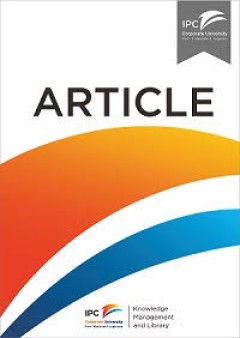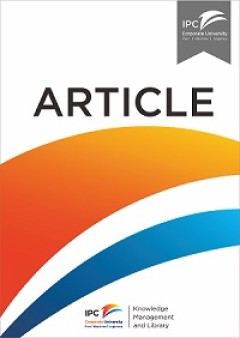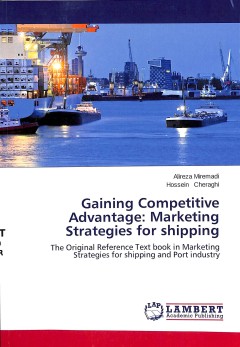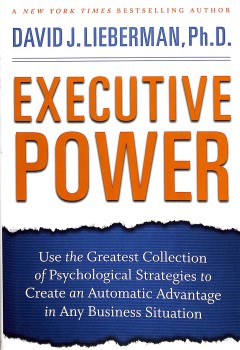Ditapis dengan

The Huawei Story
- Edisi
- -
- ISBN/ISSN
- 978-93-515-0068-1
- Deskripsi Fisik
- 244
- Judul Seri
- -
- No. Panggil
- TXT IC TAO t
- Edisi
- -
- ISBN/ISSN
- 978-93-515-0068-1
- Deskripsi Fisik
- 244
- Judul Seri
- -
- No. Panggil
- TXT IC TAO t

Presentations : Corporate Maritime Management and Strategies
- Edisi
- Corporate Maritime Management and Strategies
- ISBN/ISSN
- -
- Deskripsi Fisik
- illus,; 30 cm
- Judul Seri
- Corporate Maritime Management and Strategies
- No. Panggil
- CC STC PRE c C1
- Edisi
- Corporate Maritime Management and Strategies
- ISBN/ISSN
- -
- Deskripsi Fisik
- illus,; 30 cm
- Judul Seri
- Corporate Maritime Management and Strategies
- No. Panggil
- CC STC PRE c C1

An Evaluation of Container Development Strategies in the Port of Taichung
The objective of this study is to examine the container development strategies in the port of Taichung from the viewpoints of carriers, port authorities and shipping academics. The six most important strategic attributes from the all respondents perceptions are Enhancing the services of direct shipping with Mainland China, simplified customs procedures, simplified administrative procedures, de…
- Edisi
- Volume 26 Number 1 June 2010
- ISBN/ISSN
- -
- Deskripsi Fisik
- 26 p.
- Judul Seri
- An Evaluation of Container Development Strategies in the Port of Taichung
- No. Panggil
- ATC

A study on educations role in establishing strategies for improving safety at…
Safety at sea is a major concern of the maritime industry and it is through education and training that continued improvement can be realized. Despite increased awareness there has often only been minimal improvement made to training programs. The steady stream of accidents and disasters at sea are testament to this situation. This paper has been written to encourage a review of present maritim…
- Edisi
- Volume 27 Number 3
- ISBN/ISSN
- -
- Deskripsi Fisik
- 18 pages
- Judul Seri
- The Asian Journal of Shipping and Logistics
- No. Panggil
- ATC MR DAV s

Porter's business strategies in japan
- Edisi
- Vol. 9 Issue: 1, pp. 37-44
- ISBN/ISSN
- 1751-5637
- Deskripsi Fisik
- -
- Judul Seri
- Business Strategy Series
- No. Panggil
- ATC MG ALL p
- Edisi
- Vol. 9 Issue: 1, pp. 37-44
- ISBN/ISSN
- 1751-5637
- Deskripsi Fisik
- -
- Judul Seri
- Business Strategy Series
- No. Panggil
- ATC MG ALL p

Ships and shipping : a comprehensive guide
- Edisi
- -
- ISBN/ISSN
- 0-87814-148-0
- Deskripsi Fisik
- xi, 252 p., 23 cm
- Judul Seri
- -
- No. Panggil
- TXT PO NER s
- Edisi
- -
- ISBN/ISSN
- 0-87814-148-0
- Deskripsi Fisik
- xi, 252 p., 23 cm
- Judul Seri
- -
- No. Panggil
- TXT PO NER s

Opportunities for increased profit and reduced cost and emissions by service …
This paper investigates opportunities for increased profit and reduced emissions and cost by service differentiation within container shipping. Traditionally the strategy among the container lines has been profit maximization by utilizing economies of scale through the building of larger and faster vessels. In 2008, the financial crisis in combination with higher fuel prices put an end to this …
- Edisi
- 2015
- ISBN/ISSN
- 1464-5254
- Deskripsi Fisik
- 16 p.
- Judul Seri
- Maritime Policy & Management he flagship journal of international shipping and port research
- No. Panggil
- ATC LO LIN o

Co-operation and competition in international container transport: strategies…
This paper focuses on the response of port authorities to the changing market environment in which they operate. It documents the changes taking place in the relationships between port authorities and terminal management companies and considers the strategic issues faced by these groups and other port interests. In particular, it investigates the potential con¯ icts of interest for a port auth…
- Edisi
- VOL. 28, NO. 3, 293± 305
- ISBN/ISSN
- 1464± 5254
- Deskripsi Fisik
- 15 p.
- Judul Seri
- Maritime Policy & Management: The flagship journal of international shipping and port research
- No. Panggil
- ATC LO HEA t

Comparative evaluation of resource cycle strategies on operating and environm…
This paper examines the use of single and dual cycle operations for three types of resources, namely, quay cranes, vehicles, and yard cranes to improve the operating efficiency and reduce the energy consumption in a container terminal. Various cycle strategies are proposed and their corresponding estimation models, describing the stowage distributions of outbound and inbound containers on a shi…
- Edisi
- -
- ISBN/ISSN
- -
- Deskripsi Fisik
- 18 P.
- Judul Seri
- Transportation Research Part D
- No. Panggil
- ATC LO LEE c

Two strategies for innovating in the face of market disruption
There is no doubt that the kind of existential change required to rise to the challenge of disruption is the hardest challenge a leader will ever face. . . At the same time, it’s the greatest opportunity a leadership team will ever face. The disruption that frequently rips an incumbent apart almost always results in net market growth. – Scott D. Anthony and co-authors[1] There is another ap…
- Edisi
- VOL. 45 NO. 4 2017, pp. 9-18,
- ISBN/ISSN
- 1087-8572
- Deskripsi Fisik
- 11P
- Judul Seri
- Strategy & Leadership
- No. Panggil
- ATC LO LEA t

Seaports and the structural implications of the economic crisis
The 2008 credit crunch and the subsequent economic crisis ended a period that lasted over two decades wherein international seaports around the globe experienced double-digit volume increases. This chapter provides an analysis of the structural effects that the crisis has on seaports, focusing mostly on developments in Europe. It does so via an examination of (a) the crisis implication for each…
- Edisi
- -
- ISBN/ISSN
- 0739-8859
- Deskripsi Fisik
- 9 p.
- Judul Seri
- Research in Transportation Economics
- No. Panggil
- ATC PO LIS s

Impacts of the board of directors and ownership structure on consolidation st…
In the study I examine the relationship between corporate governance and consolidation strategies for shipping firms. The analysis is focused on the ownership structure and corporate governance power which are supposed to influence the consolidation strategies. I investigate M&As and global alliances occurred during 2006-2007 fiscal years in maritime industry. In the empirical study, I find tha…
- Edisi
- Volume 28 Number 1 April 2012
- ISBN/ISSN
- -
- Deskripsi Fisik
- 22 p.
- Judul Seri
- -
- No. Panggil
- ATC LE YEO i
The rise of the new east : business strtegies for succes in a world of increa…
- Edisi
- -
- ISBN/ISSN
- 9781137370068
- Deskripsi Fisik
- 242 p.
- Judul Seri
- -
- No. Panggil
- TXT MG SIM t
- Edisi
- -
- ISBN/ISSN
- 9781137370068
- Deskripsi Fisik
- 242 p.
- Judul Seri
- -
- No. Panggil
- TXT MG SIM t
Operations Management
- Edisi
- -
- ISBN/ISSN
- 978-87-7681-464-9
- Deskripsi Fisik
- 64 p
- Judul Seri
- -
- No. Panggil
- TXT PO POR p
- Edisi
- -
- ISBN/ISSN
- 978-87-7681-464-9
- Deskripsi Fisik
- 64 p
- Judul Seri
- -
- No. Panggil
- TXT PO POR p

Postponement Strategies for Channel Derivatives
- Edisi
- Vol. 11 Iss 1 pp. 19 - 36
- ISBN/ISSN
- -
- Deskripsi Fisik
- 20 p.
- Judul Seri
- -
- No. Panggil
- ATC LO AND p
- Edisi
- Vol. 11 Iss 1 pp. 19 - 36
- ISBN/ISSN
- -
- Deskripsi Fisik
- 20 p.
- Judul Seri
- -
- No. Panggil
- ATC LO AND p

Strategic logistics management
The material included is concise and to the point. The briefings have been designed in order that a range of issues and ideas can be quickly taken on board by the reader. The aim is not to explore each issue in depth, such learned papers will be published in this journal throughout the year. It is to look at the plethora of challenges facing logistics practitioners and researchers in the intere…
- Edisi
- Volume 27 Number 2 1997
- ISBN/ISSN
- -
- Deskripsi Fisik
- 72 p .
- Judul Seri
- International Journal of Physical Distribution & Logistics Management
- No. Panggil
- ATC LO SAN s

Connecting organizational human resource practices to consumer satisfaction
The purpose of this paper is to provide researchers and practitioners an understanding of one potentially direct linking mechanism between organizational practices and consumer satisfaction with a service.
- Edisi
- -
- ISBN/ISSN
- -
- Deskripsi Fisik
- 20 p.
- Judul Seri
- -
- No. Panggil
- ATC LE NAM c

Strategies in maritime and port logistics
- Edisi
- Vol. 17, 1, 1–8
- ISBN/ISSN
- -
- Deskripsi Fisik
- 8 p.
- Judul Seri
- -
- No. Panggil
- ATC MR MAC s
- Edisi
- Vol. 17, 1, 1–8
- ISBN/ISSN
- -
- Deskripsi Fisik
- 8 p.
- Judul Seri
- -
- No. Panggil
- ATC MR MAC s

The resilience of energy supply chains: a multiple case study approach on oil…
The purpose of this paper is to enhance the understanding about how energy supply chains work to build resilience against exogenous security threats and thereafter what support mechanisms should be introduced or improved by the European Union.
- Edisi
- Volume 19 · Number 1 · 2014 · 46–63
- ISBN/ISSN
- -
- Deskripsi Fisik
- 20 p.
- Judul Seri
- Supply Chain Management: An International Journal
- No. Panggil
- ATC LO URC t

Retail operational strategies in complex supply chains
The correct choice, implementation and evolution of an operations strategy can provide considerable competitive advantage. However, how many organizations in the Fast Moving Consumer Goods (FMCG) industries really understand the components of such strategies and their power when properly deployed? Supply chain management, lean thinking, agile operations, quick response, virtual organization, ti…
- Edisi
- Vol. 12 Issue: 1, pp.97-111
- ISBN/ISSN
- -
- Deskripsi Fisik
- 17 p.
- Judul Seri
- The International Journal of Logistics Management
- No. Panggil
- ATC LO LOW r

Dual sourcing for mitigating humanitarian supply chain disruptions
Proactive planning strategies for “slow-onset” disruptions that affect humanitarian supply chains (SC) developed to address chronic pressing societal problems, can have a significant impact on boosting the operational and financial performance of these chains. The purpose of this paper is to develop a methodology that quantifies the impact of a risk mitigation strategy widely employed in co…
- Edisi
- Vol. 4 No. 2, 2014 pp. 245-264
- ISBN/ISSN
- -
- Deskripsi Fisik
- 22 p.
- Judul Seri
- Journal of Humanitarian Logistics and Supply Chain Management
- No. Panggil
- ATC LO KER d

Demand side integration for electric transport vehicles
The purpose of this study is to examine both the technical feasibility and the commercial viability of several demand-side integration (DSI) programs to utilize the charging flexibility of electric transport vehicles in a logistic facility. DSI is important for improving system reliability and assisting in integrating renewables into the energy system.
- Edisi
- Vol. 9 No. 4, 2015 pp. 471-495
- ISBN/ISSN
- -
- Deskripsi Fisik
- 27 p.
- Judul Seri
- International Journal of Energy Sector Management
- No. Panggil
- ATC LO KOL d

a Quantitative analysis of European port governance
The ever-changing environment in which ports operate has put strong pressure on the role of port authorities. The evolution of port governance has so far mainly been analysed in qualitative terms, through expert knowledge and case studies. This article fills a research gap in providing a quantitative analysis of port governance in Europe, using data from a major survey, which the European Sea P…
- Edisi
- Maritime Economics & Logistics (2012) 14, 178–203
- ISBN/ISSN
- -
- Deskripsi Fisik
- 26 pages
- Judul Seri
- -
- No. Panggil
- ATC PO VER q

Gaining competitive advantage : marketing strategies for shipping
The competitiveness of a port convinced shipping lines and shippers with a significant basis in selecting a port. Port authorities and port operators can make use of the competitive advantage as a parameter for counter measures by grasping the advantages and disadvantages of the ports and be a prime factor of opportunities and threats of the ports. Ports have a significant role in today’s net…
- Edisi
- -
- ISBN/ISSN
- 978-3-659-34804-4
- Deskripsi Fisik
- 94 p., 21 cm
- Judul Seri
- -
- No. Panggil
- TXT PO MIR g

Executive power : use the greatest collection of psychological Strategies to…
In today's hich-octane business world, you need all the advantages you can get. Success isn't just about making the right decisions or adopting smart strategies. Success also depends on knowing what's going on around you. As a business leader, imagine if you could almost always tell when people were lying to you, or if you could successfully persuade colleagues, workers, or bosses to always g…
- Edisi
- -
- ISBN/ISSN
- 978-0-470-37282-1
- Deskripsi Fisik
- xiii, 202 p, 24 cm ; index
- Judul Seri
- -
- No. Panggil
- LC 658.0015 LIE e
 Karya Umum
Karya Umum  Filsafat
Filsafat  Agama
Agama  Ilmu-ilmu Sosial
Ilmu-ilmu Sosial  Bahasa
Bahasa  Ilmu-ilmu Murni
Ilmu-ilmu Murni  Ilmu-ilmu Terapan
Ilmu-ilmu Terapan  Kesenian, Hiburan, dan Olahraga
Kesenian, Hiburan, dan Olahraga  Kesusastraan
Kesusastraan  Geografi dan Sejarah
Geografi dan Sejarah